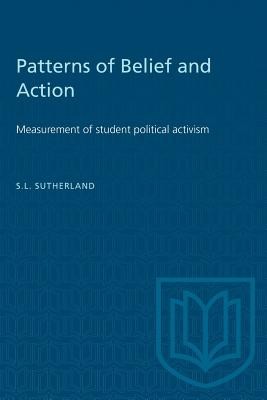
- We will send in 10–14 business days.
- Author: S L Sutherland
- Publisher: University of Toronto Press
- ISBN-10: 1487573626
- ISBN-13: 9781487573621
- Format: 15.6 x 23.4 x 2.1 cm, minkšti viršeliai
- Language: English
- SAVE -10% with code: EXTRA
Reviews
Description
Devoted to the study of political attitudes and behaviour, this analysis attempts to improve the predictability of the activity from attitudes. Through an analysis of data relating to the attitudes and behaviour of students at the University of Alberta toward the social phenomenon of 'student power' in the late 1960s, Professor Sutherland addresses three main questions: what proportion of students form internally consistent and coherent viewpoints about student participation in the affairs of the university? what are the characteristics of the attitude 'clusters' which facilitate activity? and what social attributes encourage an activist posture, either for or against student power?
This analysis reflects the conviction that any one attitude will be only weakly related to a specific behaviour because the meaning of that attitude, and thus its implications for action, will vary depending on other attitudes held by the individual and on the social context in which the attitude is learned and held. thus, before behavioural implications are drawn, a whole complex of viewpoints must be identified and the meanings of actions must be viewed in their context of manifestation.
This study makes a significant contribution to the field of attitude-behaviour research and studies of political radicalism and will be of particular interest to sociologists and social and political psychologists.
EXTRA 10 % discount with code: EXTRA
The promotion ends in 22d.19:39:42
The discount code is valid when purchasing from 10 €. Discounts do not stack.
- Author: S L Sutherland
- Publisher: University of Toronto Press
- ISBN-10: 1487573626
- ISBN-13: 9781487573621
- Format: 15.6 x 23.4 x 2.1 cm, minkšti viršeliai
- Language: English English
Devoted to the study of political attitudes and behaviour, this analysis attempts to improve the predictability of the activity from attitudes. Through an analysis of data relating to the attitudes and behaviour of students at the University of Alberta toward the social phenomenon of 'student power' in the late 1960s, Professor Sutherland addresses three main questions: what proportion of students form internally consistent and coherent viewpoints about student participation in the affairs of the university? what are the characteristics of the attitude 'clusters' which facilitate activity? and what social attributes encourage an activist posture, either for or against student power?
This analysis reflects the conviction that any one attitude will be only weakly related to a specific behaviour because the meaning of that attitude, and thus its implications for action, will vary depending on other attitudes held by the individual and on the social context in which the attitude is learned and held. thus, before behavioural implications are drawn, a whole complex of viewpoints must be identified and the meanings of actions must be viewed in their context of manifestation.
This study makes a significant contribution to the field of attitude-behaviour research and studies of political radicalism and will be of particular interest to sociologists and social and political psychologists.


Reviews